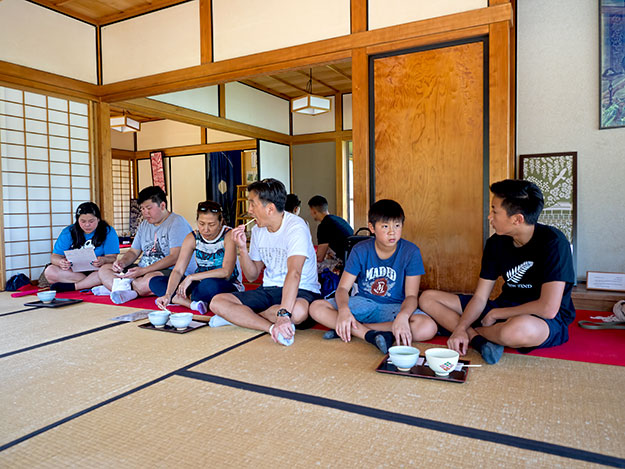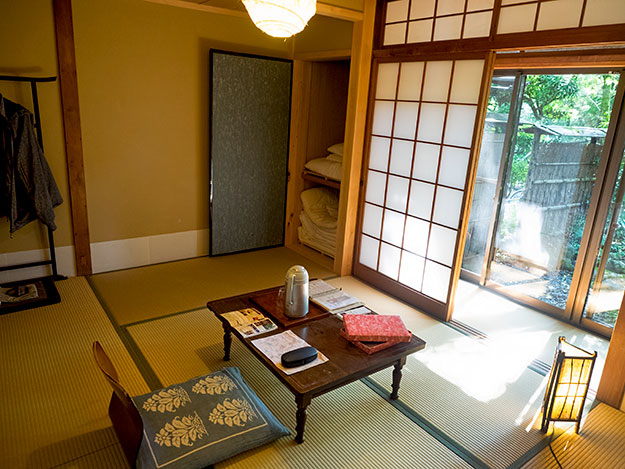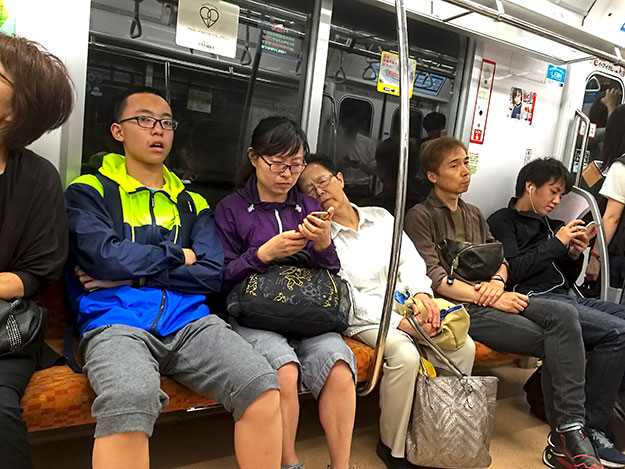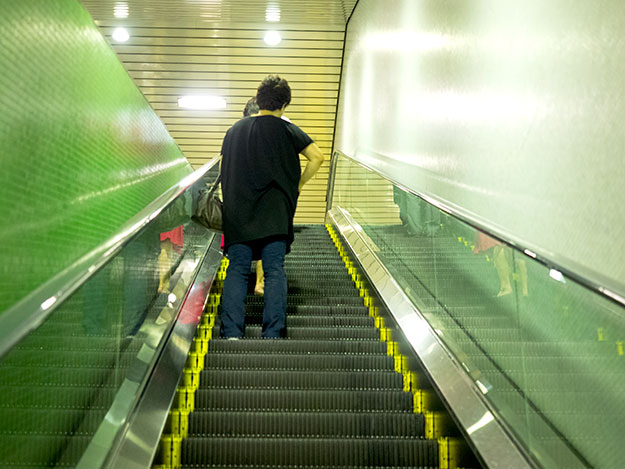Just the idea of traveling to Japan can be intimidating. It is a culture like no other around the globe, with a unique language, food, and cultural rules. Having just spent two weeks there, I thought it would be good to pass along the following things to know before going to Japan.
- It is considered impolite to blow your nose in public
- Take off your shoes when entering a private home or tea house

- When making a purchase in a store, put money in the tray that sits on the counter. Your change will be placed there by the clerk for you to pick up.
- Japanese greet one another with a short bow and you should do likewise. Only offer your hand to shake if they do so first.
- People in service industries will often bow to you. For instance, before leaving a carriage, conductors on trains will turn around and bow to the passengers.
- When leaving temples, you should turn around at the entrance and bow to the altar
- Few Japanese I met admitted to speaking English. More puzzling, unlike in most other countries I have visited, older Japanese seemed more adept at English than younger ones
- Other than signs on highways, streets, in train stations, metro stations, and airports, you will find very little written English
- A Ryokan is a traditional Japanese guest house where you will sleep on tatami-covered floor mats, over which a thick futon mattress is placed. You may be expected to make up your own bed. The only other furniture may be a low table with a chair back and perhaps a lamp on the floor. (A Ryokan is just one type of accommodations in Tokyo). Traditional hotels, guest houses, and great Air B&B rental apartments in Tokyo are also available (I personally chose to stay in such a vacation rental property).

- There are two types of traditional baths in Japan. The first is a soaking tub, filled with hot water from the tap, in which no soap or shampoo is permitted. This tub is only used after a vigorous shower, as it will be shared by many people. The second is an Onsen, which is fed by mineral springs. An Onsen is almost always clothing optional. Very specific etiquette is required when using these hot springs in Japan. To learn more, refer to this story about the Best Japanese Onsen in Japan.
- Vegetarianism is largely misunderstood and it is difficult to find foods that do not contain meat
- I never saw a single piece of graffiti or a homeless person in Japan
- Aside from traditional temples and a scattering of old preserved Japanese-style homes, don’t expect inspiring architecture. Most Japanese live in cube-like apartment buildings or single-family homes that are unadorned boxes.
- It is prohibited to talk on your cell phone while riding on trains or on the Metro. Loud conversations are also frowned upon, as is playing music loud enough to be heard from your earphones. However it is perfectly acceptable to fall asleep on the shoulder of a complete stranger.

- Japanese are extremely pleasant, polite, kind people who will do whatever they can to help you
- If a place of worship is called a temple, it is Buddhist; a shrine is Shinto
- Never throw trash on the sidewalk/road and take care to recycle whenever possible
- All over Japan, there is a total lack of trash bins and seating in outdoor areas. At one temple, my friends sat down on the street curb to rest, as the temperature was in the mid 90’s and there were no benches anywhere. A guard rushed over and demanded they get up. When they asked why, he said it was considered “very rude.”
- Bicyclists ride on the sidewalk rather than in the street. In major cities, sidewalks alongside major thoroughfares are divided into pedestrian and bicycle lanes. Strangely, in a country where people follow the rules without question, bicyclists often prefer to weave among people in the pedestrian lane rather than using the bicycle lane.
- Trees, bushes, and flower beds in Japanese parks are all meticulously pruned and weeded, however the grass is allowed to grow wild
- Never jaywalk or cross a street when a light is red, even if there is no traffic in sight
- Japanese drive on the left side of the road
- On an escalator, Japanese stand on the left so that people who wish to walk past may do so on the right-hand side

- You will never get a napkin with your meal in a restaurant. Often, you will find wet wipes in plastic packages on the table, or occasionally there will be boxes of tissue set out instead.
- There is NO tipping in Japan. If you leave money, they will likely chase you out the door to return it to you, thinking you made a mistake.
- Electricity is 110/50, with two prong plugs exactly like the 2-prong plugs in the US. Most electronics will be rated 110-240/50-60, so will work fine without a converter (hair dryers and curling irons excepted).
- Japanese technology will blow you away. For me, the most amazing was learning how to use a toilet in Japan.
- Japanese will always give up their seat on the Metro, etc. to elderly, pregnant women, and children, and you should follow suit.
- I have always been mystified by the number of Japanese who wear face masks. I wondered what they were afraid of catching. My assumption could mot have been more wrong. I learned that Japanese wear face masks when they have a cough or cold, so as not to infect others.
In closing, let me reassure potential visitors to Japan who find this list daunting. Though the Japanese have many stringent customs that may seem strange to us, they are very kind, gentle people. They understand that their ways may not necessarily be our ways. You will find them to be very forgiving and understanding if you happen to do something that is frowned upon, or even prohibited, in their culture. They seemed very grateful for my attempts to be culturally sensitive and aware, and I hope this list of things to know before going to Japan will help others to have a similar experience.

Very thorough and fun list. I enjoyed it and even learned a few things despite making Japan my home these past 18 years.
One thing of interest you might want to add (or not): the escalator rule is opposite in the Osaka/Kyoto/Kobe region known as Kansai. Stand on the right, pass others on the left.
Cheers!
Thanks T-Ray. Yo just added it through your comment! Thanks so much for sharing.
I lived in Japan for many years and I agree with almost everything you wrote except for them giving their seats to elderly people and pregnant women. I didn’t see that very often regarding the elderly, and I never saw any men give their seat to a pregnant lady, I saw women doing it, including me. Apparently things changed since I left, and this is excellent news 🙂
Hi Maria: I’, 64 with white hair and it happened to me several times, and I saw it happen to others quite regularly. Maybe things have changed in that regard. Thanks so much for your comment.
Enjoyed reading this. We’re planning our first trip to Japan in November.
Frank (bbqboy)
Glad you enjoyed it, Frank. More to come – just today I published one about how to use Japanese toilets and other unusual technology I saw there. Next week, an overview and itinerary of my to weeks there. That might help you decide what to see and what to pass up.
Hi Barbara!
I’ve been reading your blog ever since we met in Reykjavik at the coffee shop (it was in April, and I was with my mom). We are both heading to Japan in November, and I was excited to find that you visited recently! I am vegan and anticipate having a difficult time finding things I can eat in Japan. Any recommendations? We will be staying in Tokyo and Kyoto. Safe travels wherever you find yourself next!
Amanda Alexander
Hi Amanda! Great to hear from you. I have to say that eating in Japan was a challenge. Restaurants were the most difficult, as everything seems to have meat products. I did a couple of things as a work-around that might help you. First, make sure you have the Google Translate app downloaded onto your smartphone. Then, when you start looking for accommodations, look into Air B&B or other such apartment rentals. They all offer wifi, and in Japan I found that the wifi routers in the apartments were all battery-operated mobile units that you can unplug and take with you as you roam about the city all day. That way, you’re totally connected all the time. Once you have that, you can easily read the ingredients with Google Translate. Open the app and click on the little camera icon. This will launch the camera on your phone. Hold it over the text you want translated and take a photo. It will “scan” the copy and select each word. Once the scanning is done, swipe your finger over the text that you want translated. You can do this for multiple lines; just don’t raise your finger from the screen until you have highlighted everything you want to translate. It will then tell you the English translation. I also translated to Japanese an explanation that I was vegetarian and ate no beef, chicken, pork, etc. Once I had the translation on my cell phone screen, I captured it in a screen shot, which was automatically saved to my photo library. That way, I could just show it to everyone. Hope that helps. Please let me know you got this!
Thank you so much for your detailed response! I am definitely going to take your advice. You mentioned a lot of things that I never would have thought about! Did you find the language barrier to be difficult in general while you were there?
Hi Amanda: Well, it wasn’t as difficult as China, for instance, but it also wasn’t easy. The good thing is that all the transportation signs are in English – metro, highway, train stations, etc., so you can get around quite easily. And I did find a few people who spoke fluent English, but as I said in the article, they were all older people. Surprisingly, the younger ones are no as adept. But I think you’ll be fine.
Thanks for sharing! Having just returned from a little over a week in Japan, I agree with all your observations. I would add that it’s customary to put your used chopsticks back in their paper sleeve after finishing your meal. I also recommend the Pasmo card to pay for train/subway rides. It’s a prepaid rechargeable card similar to cards used in NYC and Chicago for the metros. Happy travels!
Ooh! Thanks for sharing that about the chopsticks, Beth. I didn’t know that, but your comment also made me realize I forgot to include the fact that you shouldn’t ever stick your chopsticks upright in a bowl of food or pass food from one set of chopsticks to another, as those are all related to death rituals.
Lovely post. It tells us some of the strangest things about Japanese like falling asleep on someone else’s shoulder. But I think these things are the true beauty of any country that explain the its tradition and culture.
I thoroughly enjoyed the culture of Japan, Maria. They are such a kind, gentle people. Glad you enjoyed my “little” list.
A short comment on Japanese technology. A few years ago I worked with several Japanese engineers on a project in Ohio. They all brought a steamer trunk for electronics to take back home for themselves and as gifts. They told me that they can buy better Japanese electronics with more features for less money in the US than they can in Japan. Go figure.
Hi Larry: I have another story coming up on Japanese technology, so your comment is very timely. I was amazed by some of the technological innovations in Japan and wondered why we don’t have them in the U.S.
Thanks for sharin, my best friend who works for Delta, was recently in Japan and loved it.
I will forward this to him!
I will be on the road August 1 or 2 to Texas, going to miss The Rev, if your ever in San Antonio, let me know, I will be living in Sequin, right outside of San Antonio.
Paul
aka The Mayor
Hi Paul! So, you’re finally making the big move. I’m so happy for you. Know you’ve dreamed of this for a long time. I will definitely get in touch if I ever head for San Antonio, my friend. Much love to you.
Japan is definitely worth visiting. Great culture great people. and the technology. WOW.. 🙂
It was mind-boggling and fascinating, all at the same time, Tina. So glad I finally made it to Japan.